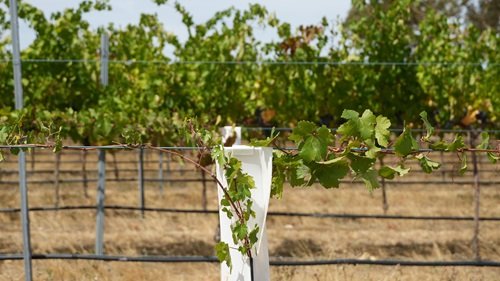Sunday, 22 February 2026
A fine blend of science with heritage grapevines to ensure future of Australian wines
New climate-resilient and mildew-resistant grapevines have been planted in South Australia to help protect Australia’s $45 billion industry New mildew-resistant and drought-resilient grapevines have been planted in South Australia’s Coonawarra…

New climate-resilient and mildew-resistant grapevines have been planted in South Australia to help protect Australia’s $45 billion industry
New mildew-resistant and drought-resilient grapevines have been planted in South Australia’s Coonawarra wine region to help safeguard the future of Australia’s wine industry against a changing climate and disease threats.
Australia’s national science agency, CSIRO, and Treasury Wine Estates (TWE) partnered to future-proof some of the most collected wines in the region from old vines, with the first vines of the new progeny recently planted at Wynns Coonawarra Estate.
The new grapevines blend genetics from TWE’s heritage vines in Coonawarra and Barossa Valley, which have enhanced climate resilience, with mildew-resistant traits developed through years of selective breeding by CSIRO, with funding from Wine Australia.
Powdery and downy mildew costs the Australian wine sector an estimated $160 million in management expenses and production losses annually.
CSIRO Research Scientist and project lead, Dr Paul Boss, said breeding mildew resistance into elite vines gives future grapevines a genetic advantage to withstand these disease-causing pathogens.
“Using traditional breeding methods, we introduced two distinct genes to the Wynns heritage vines, which give resistance to downy mildew and powdery mildew,” Dr Boss said.
“These are from CSIRO-developed breeding lines that confer robust disease resistance and other quality traits onto their progeny.
“Having resistance genes for both powdery and downy mildew makes these plants more robust as it is unlikely the pathogens can break both sources of resistance with a single mutation.”
Technology
Tetra Pak extends paper-based barrier packaging to high-speed packaging lines in Asia
Feb 19, 2026 | Company News
Food Testing
Redefining Trust in Organic Foods through Independent Testing
Feb 13, 2026 | Food Safety and Testing
AFNOR International Eyes Global Food Safety Growth with HACCP Group Takeover
Feb 04, 2026 | Australia
More Popular
Strong Q4 Drives Coca-Cola Consolidated to Record FY2025 Results
Feb 20, 2026 | Beverages
The Kraft Heinz Company Appoints Nicolas Amaya as President, North America
Feb 20, 2026 | Company News
Orkla Food Ingredients acquires Senna
Feb 20, 2026 | Company News






